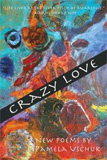July 25, 2009CRAZY LOVE
Review by Willie James King
Wings Press
627 E Guenther
San Antonio, TX 78210-1134
ISBN 978- 0- 916727- 58- 1
2009, 102 pp., $16.00
www.wingspress.com
When the head and heart are one, nothing is impossible. Pamela Uschuk’s fifth full-length volume of poems does more than allude. Crazy Love skillfully shores up the poet’s keen observation of mankind, as well as her understanding of the natural world; she juxtaposes both to forge only one. And the speaker is not merely in dialogue with herself and this world, but is very much aware that the reader is also there, which makes these poems three-dimensional. Whether or not the reader refuses to participate in such subtleties, one cannot help but reach for answers to the fine metaphorical touchstones registered while on this sojourn: “The hemlock loses the tanager,/ a bright streak/ in a whirling gauze of snow./ Where do we go?” the speaker posits early on, in the opening of the first poem, “The Horseman Of The Crass And Vulnerable Word.” And in the very next line: “ You told me the eye was lost.” So, she becomes “the eye.” She knows someone has to see in order to save us where blind spots cause us to blunder, to commit atrocities, pogroms.
In “With Its Toll Of Char,” the reader gets to observe a fox kneeling above its mate, struck by a car in New York, where the speaker says: “This fox is real./ It’s dangerous you say,/ to swerve/ for animals caught on the ice.” Later, in the last stanza: “The fox might have started sooner/ from my on-coming car, but he stood/ taking her scent a last time/ that common night/ none of us could any longer take for granted.” One finds in the expediency of the language and crisp clarity of the tropes in “The Horseman Of The Crass And Vulnerable Word” that these are not mere nature poems, but poems that engage the reader on a personal level. One finds, when closely examining these, that there isn’t anything that is not nature. As soon as one begins to see and to understand his relationship to the natural world, he will find that his own life depends on everything else about him on this planet, no less than Native Americans knew all along.
In the last three lines of the penultimate stanza of “Hit And Run,” the speaker engages us: “In the book of politics, poverty/ is the last sin to die .” That kind of “poverty” is observed in the last stanza of the same poem where the speaker says: “Who notices one more nameless death/ these days. He was someone’s son./ At the scene, no police,/ no culprit, just the beginning of rictus./ Whoever hit the young man is long gone/ inside a coward’s shoulder/ turning away.” The poet is not only showing how our reckless behavior causes pain, but how contempt that is directed toward one creature might be easily redirected to another. Music ripples here as well as grief for the destruction of the environment, grief for poverty, and grief for war and the many ways in which it is encountered.
In the third section of the book we find “We Thought No One Could See Us, ” one of several poems that is a condemnation of the invasion of Iraq. The speaker alludes to our national blindness in the lines: “The illusion we’ve loved that/ we’re alone and secret in the woods, instead/ of backed up like a trunk full of contraband/ to a dull suburban development,/ begins to unravel as we tilt away from sun.”
And, “Look at these hands, purpled by May’s final/ winter slap, wrinkled as rice paper, chilled/ from eating cottage cheese and wine/ that knifes through branches like a rapist/through lace” are the opening lines of “Fighting the Cold.” This poet knows what love is; she knows the names of things. Hers is a voice we can trust. The “eye,” once thought lost, is roving every which way. Not even the speaker is spared.
These fine poems help to make it clear how a country can invade another (no less than our invasion of Iraq), why one race might claim superiority over another, why there is a road in New York where one lone fox must be still searching for its mate. No! I would not call Pamela Uschuk’s new book “Crazy Love” at all, but the kind of love that could save us, if we would only listen.